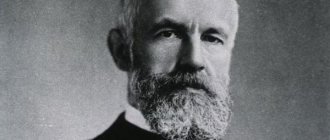Subjects and tasks of psychology
Psychology is a separate science that studies the development, manifestation, and changes of the human psyche. There are 3 main tasks:
- study of physiological mechanisms of the psyche;
- research, analysis of the emergence and development of various mental phenomena;
- developing techniques that will help a person achieve the desired results.
In addition, psychologists are looking for deviations in mental development, as well as methods for their treatment.
Psychology as a science is based on a number of principles:
- Unity of psyche, consciousness, activity. Consciousness is a consequence of the fact that people once began to work. Thanks to their ability to think, they can set goals and act in their direction.
- The principle of determinism. The development of consciousness and psyche is influenced by external factors. Consciousness depends on those factors that exist in society (social).
- Development of consciousness, psyche in activity. At birth, every person receives inclinations that he must develop throughout his life. If he doesn't do this, they remain in their infancy. If you spend time developing your inclinations, they become talents or professional skills.
The latter is the principle of a personal approach when studying an individual personality. Each person has his own character, temperament, nervous system. These characteristics and properties must be taken into account when studying them.
In short, psychology has connections with almost all other sciences, from philosophy and history to biology and medicine.
Main industries
In psychology, there are a number of branches, each of which relates to different areas of human life:
- Genetic. Studies the innate characteristics of the psyche and behavior. Scientists are trying to highlight the connection between character traits and genotype.
- Differential. Explores the individual characteristics of the psyche of different people, their formation, prerequisites for development.
- Age. Studies the development of the psyche throughout life. Each age period is characterized by certain psychological characteristics, which scientists try to identify in order to predict the behavior of people at different periods.
- Children's room. It is based on the study of the development of consciousness, activity, mental processes, and personality of a growing person.
- Pedagogical. Studies the development of personality depending on the methods of education and training.
- Social. Responsible for analyzing the behavior and development of people in society.
- Psychology of work. Considers the activities of individuals alone and in a group, develops techniques to increase productivity.
- Engineering. Studies the processes of interaction and human understanding of modern technology. Considers new mechanisms, analyzes the further development of technological progress.
- Space, aviation. These industries are similar to each other. Experts study changes in the mental state of pilots and cosmonauts during flights.
- Medical. Studies the mental activity of doctors and the behavior of patients. Responsible for the development of methods for treating psychological disorders.
- Clinical. Engaged in the study of mental disorders, identifying the causes of their occurrence, studying changes in the state of the psyche, behavior, and any psychological disorders.
- Legal. Reveals the peculiarities of behavior of participants in any criminal process. Based on the information received, scientists can form a portrait of the criminal.
- Military. Explores human behavior during combat.
- Parapsychology. Engaged in the study of unusual human abilities. It is considered the most controversial and debatable area.
Psychology and philosophy
Even today, psychology is inextricably linked with philosophy. And all because it often touches on such serious topics as the meaning of life, the purpose of existence, the reasons for the loss of inner harmony. Many psychological techniques and techniques are based on the teachings of Freud, Jung, and Fromm.
It is interesting that these two sciences cannot exist separately from each other. They are closely intertwined in the process of studying the same objects. We are talking about the social and biological factor of each person, knowledge of the world around us, the search for the meaning of life, the definition of life values.
The place of psychology in the system of sciences
Psychology as a field of scientific knowledge in the humanities is closely related to many sciences. This is due to the fact that it is in an intermediate position between the philosophical, natural, social and technical sciences. This fact is due to the fact that a person, as a subject of research, is considered from different points of view. A person can act as a study as a biological object, a social being, as a carrier of consciousness. The uniqueness of the human personality lies in the fact that it is unique. It is this diversity of manifestations of man as a natural and social phenomenon that is the source of the emergence of a significant number of sciences that study man.
Psychology and history
The connection between psychology and history is no less than in the case of philosophy. Values, patterns, requirements and foundations in society change with enviable regularity. They influence the conditions in which a person lives and his personality.
There are other points:
- Historical events to one degree or another have an impact on the human psyche.
- People influence history. Of course, not all. But there are those who change its course for good or bad.
Another pattern clearly stands out: not a single phenomenon from psychology can be explained without studying history. This is confirmed by the psyche. Think about where the information about the similarities and differences in the psyche of humans and animals came from? From the history. The same applies to the development of certain psychological problems, the influence of external and internal factors on behavior.
Man needs society. Studying history is an opportunity to see how social consciousness has developed. Psychology even has a separate branch - historical. She explores how the psyche developed and social experience was acquired at different periods of time.
Interaction with other disciplines
To understand which scientific trends have had a greater impact on the psychological discipline, you need to consider its relationship with history, philosophy, sociology, pedagogy, anatomy, biology, medicine, law, management, and conflictology.
A diagram of the interaction of psychology with other sciences can be found in reference books on this discipline.
With history
The direction has a close connection with psychology. Every century, decade, social requirements, behavior patterns, stereotypes, and values change. The discipline studies the influence of:
- the course of history on the human condition;
- accumulated historical experience on the development of personality from birth.
Not only history influences people's lives, but also people themselves influence its course. The connection between psychology and this discipline is clearly seen in the fact that not a single psychological phenomenon can be comprehensively studied without using a historical database.
It is impossible to imagine a person without contact with society. With the help of history, you can trace the stages of development of society. Together, psychology and history make it possible to analyze the stages of human development and predict events in the coming decades.
With philosophy
Psychology originates from philosophy. Most psychological teachings are based on this discipline. Despite the fact that these are two separate sciences, they cannot exist independently. Therefore, when studying one discipline, one must take into account the theories of another.
With sociology
Man is a socio-biological being. Based on this statement, we can say that sociology and psychology are closely related.
Scientists are still arguing about what has a primary influence on personality development—society or genes, but they recognize that both factors play a huge role. Without the influence of society, a subject cannot learn to live correctly in a particular society.
There is a separate branch of science - social psychology. This direction deals with the study of society, the influence of society on an individual subject.
From sociology, psychological science adopted surveys and questionnaires. These research methods help obtain information of interest from groups of people.
With pedagogy
Associated with this area are psychological techniques that are aimed at training and re-educating children of different ages. It is impossible to raise a child correctly if you do not take into account the peculiarities of mental development at a certain age. In order for the teaching method to be most effective, it is selected taking into account the character characteristics of the individual.
To understand which learning strategy is best to choose for a child, you need to conduct a series of psychological tests and ask the child to answer questions of interest. It is easier to obtain information from a child through games or drawings.
With biology and anatomy
Biology reveals the second side of humanity - innate abilities. At the intersection of these disciplines, a number of mixed directions have emerged:
- Psychogenetics is a separate science that studies psychophysiological and mental properties and their changes under the influence of heredity.
- Neuropsychology is an interdisciplinary field that studies the functioning of the brain and the connection between brain processes and mental ones.
- Animal psychology is a scientific field that studies the psyche of animals. Experts study how animals see the world.
With the help of biology, scientists learn what physical disorders affect the body, and the discipline of psychology helps determine how they affect the psyche. The biological discipline explains why children are born with pathologies.
With medicine
Another discipline with which psychology is closely intertwined. At the junction of these two areas, clinical or medical psychology was formed.
With its help, scientists study diseases, mental disorders, and develop methods for treating pathologies.
With jurisprudence
Attention should also be paid to the connection between investigators and psychologists. If you do not know the psychological profile of the criminal, it is impossible to get the offender to talk and predict his actions.
Experienced investigators are proficient in psychological influence techniques and can obtain information of interest through special questions that, at first glance, do not relate to the individual. The person conducting the interrogation must have high resistance to manipulation. Otherwise, an experienced criminal will easily mislead him and confuse the facts.
With management
Management is a set of management techniques and personnel selection for a specific position. With their help, you can select valuable employees from a huge number of willing employees, effectively distribute labor, and speed up the production process. Psychology is related to management in many concepts and practices. Without psychological knowledge, it is impossible to consider the talents, inclinations, hidden motives of a worker, and to find a lever of pressure on the individual.
Almost all modern management practices are based on the teachings of psychology. The basics of this science have helped to create effective methods of managing people to achieve a specific goal.
With conflictology
A separate discipline that studies the features, patterns, prerequisites for the emergence and development of conflicts. A person is constantly under the influence of external factors, which can be both good and bad. If a subject does not know how to control his emotions and find a way out of difficult situations, he will unconsciously enter into conflicts.
Conflictology helps:
- Resolve intrapersonal conflicts. Such situations can lead to mental health problems. If the internal conflict is serious, it can drive the subject to suicide. Conflictology teaches people to manage experiences and feelings in order to neutralize the negative effect of such phenomena.
- Choose the right behavior in conflict situations. The adult personality trait is correct behavior. This concept can be deciphered as a constructive perception of reality, adequacy, good manners, productive interaction with society. If the subject is accustomed to resolving conflict situations by force, this indicates his emotional weakness.
- Smooth out conflict situations by resolving them for the benefit of all parties to the dispute. When a subject shows kindness, restraint, does not end the argument on his own terms, rudeness, insults, he shows others that he cares not only for his own interests, but also for other people.
- Maintain peace with yourself and others. This is how a person achieves a positive mental state. When it is achieved, labor productivity will increase, the amount of stress and grief will decrease.
The connection between conflictology and psychology is obvious. If a person has a strong psyche without deviations, knows how to control his emotions, analyze conflict situations and develop options for resolving them, he can easily avoid problems.
With finances
Specialists in this field study factors affecting the economy, working with money, and the relationship between seller and buyer. Using economic psychology, you can analyze the market and how sellers will behave when the exchange rate changes.
The subject of this discipline is an economic entity. This phrase can refer to an individual, a family, an organization, a concern, a state or a nation.
Psychological economics does not have its own study methods. All practices used are taken from other scientific fields.
Psychology initially arose from the works of the first philosophers. As humanity developed, the psychological field began to come into contact with other disciplines.
Against this background, new sciences and teachings appeared, and the theoretical base expanded. Today, the connection between psychology and most existing scientific disciplines is visible.
Psychology and Sociology
Another type of connection between developmental and other types of psychology with sciences. Everything is simple here. Just remember the words that man is a socio-biological being. Scientists are still arguing about what influences people more: heredity or society. No one will argue that both of them have a strong influence. Without society you cannot learn to live in society.
There is a separate direction - social psychology. It studies the formation and development of society as one organism, as well as human behavior in a particular group. Sciences exchanged working methods among themselves. In particular, the idea of conducting surveys and filling out questionnaires came from sociology.
Afterword
Thus, we can say that psychology occupies a central place in the system of all scientific knowledge. It connects all spheres of human life. Psychology is increasingly being included in various educational programs as a special or applied discipline.
In addition to the sciences described in the article, psychology is also connected with political science, economics, and construction. In general, everything that concerns human life. Plato also called psychology the queen of all sciences. Although it began to be recognized as a separate science later (mid-19th century - early 20th century). A. Kedrov’s classification remains relevant to this day, in which he placed psychology at the center, and made philosophical, technical and social sciences adjacent to it.
Modern psychology has many branches and their names speak for themselves (regarding the connection between psychology and other sciences):
- general psychology;
- social Psychology;
- age-related psychology;
- clinical psychology;
- pedagogical psychology;
- engineering psychology;
- differential psychology;
- gender psychology;
- comparative psychology;
- zoopsychology;
- aviation psychology;
- space psychology;
- psychophysiology;
- psychology of advertising;
- military psychology;
- parapsychology;
- psychology of management;
- environmental psychology;
- legal psychology.
The field of psychology is expanding as quickly as new professions are emerging, for example, ergonomist psychologist. His responsibilities include informing technology designers about how best to design machines, robots, and automatic machines for the human psyche (level of light, sound, location of levers, display); how and under what conditions and circumstances certain standards must be observed.
Psychology and pedagogy
The connection between child psychology and other sciences is clearly visible here. The areas are related to the development of children, their education, upbringing and re-education. None of the processes can be considered complete if the psychological characteristics of a particular child are not taken into account. Ideally, educational and educational programs should also be selected taking into account the characteristics of the individual, his abilities and capabilities.
There is educational psychology. It covers the issues of adapting a child to learning, creating the necessary conditions for him, instilling in him values and social norms.
Psychology and biology
Biology illuminates innate abilities. When it merged with psychology, zoopsychology, psychogenetics, and neuropsychology appeared. Biology tells us what physiological problems a person may have. Psychology is trying to figure out how they affect the psyche and behavior.
Biology studies not only humans and the world around them. The subject of the study is the influence of natural factors on each individual person. Psychology, in turn, shows how the structure of the brain is connected with the psyche, how the nervous system works, and how psychological pathologies affect physical health.
Interdisciplinary connections of modern psychology
All topics in this section:
Definition of psychology as a science The word “psychology” comes from two Greek words: “psyche” - soul and “logos” - science.
Psychology is the science of the psyche, i.e. about this form of reflection of reality The main stages of the history of psychology In the history of psychology, the following stages can be distinguished: pre-scientific, pre-scientific, natural science, stage of scientific specialization. Donau lasted the longest
Objective nature of mental laws Since psychology is a science, it studies mental phenomena in their objective, i.e. independent of anything other than active causes. What does this mean? This
Psyche and brain The psyche is a function of nervous matter, nerve cells, the largest accumulation of which is the brain. The brain is incredibly complex. It consists of two
Nervous system and its structure The brain is the main organ of the nervous system in humans and animals. However, its activity is ensured by the entire nervous system of the body. Since the human nervous system is the most complex
Psyche and consciousness The psyche of a living being is a product of the nervous system and brain. In the process of evolution, the psyche arose from the primary forms of movements of plants and animals that occurred in response to external stimuli
Structure of consciousness Consciousness as the highest form of mental reflection has the following structure. Firstly, it is a body of knowledge about the world around us. Consequently, the structure of consciousness includes cognitive
Conscious and unconscious There are two levels in the human psyche: conscious and unconscious. The unconscious, the unconscious, is the totality of all mental processes and states
Modern psychology, its tasks and place in the system of sciences Modern psychology is a complex science. It represents an extensive system of scientific disciplines that study the psyche in all its diversity. Since the subject of psychology is the laws of
The structure of modern psychology Modern psychology is represented by many psychological disciplines. To understand the reasons and essence of this diversity, one should take into account 1) the peculiarities of the study of the psyche in
General description of psychology methods The main methods of psychology are observation, conversation, experiment, testing. 1. Observation is a method of studying objects and phenomena, which I conclude
The problem of objectivity in psychological research and the organization of specific psychological research The psyche is not a natural phenomenon. It cannot be touched, weighed, or seen. The psyche belongs to a special reality - ideal. That is why the problem of obtaining objective, i.e. reliable,
When conducting psychological research, there are five stages. The first stage is indicative. It includes preliminary observations of the phenomenon being studied, the formulation of assumptions about the possible causes and properties of the phenomenon, and the formulation of
Correlation as an alternative to experiment Correlation (from the Latin correlation - ratio) is another method of both processing data and obtaining it. The fact is that sometimes it is impossible to apply an experiment in the study of the psyche
General characteristics of the physiological basis of sensations Sensation is considered the simplest of all mental processes. All living beings that have nerve cells have the ability to sense. Feeling is a reflection in the psyche
And the general properties of sensations Sensitivity is the property of the analyzer to respond to the corresponding stimulus. Special studies have shown that the stimulus causes in the analysis intended for it
And the physiological foundations of perception Perception is the mental process of reflecting objects and phenomena in the totality of their qualities and properties with their direct but non-contact impact on the senses.
Properties of human perception The primary property of human perception is objectivity. The objectivity of perception is expressed in the fact that everything that a person perceives when formulated into an image of perception, t
Perception of space The main role in the perception of space is played by binocular vision. Only one two-dimensional image is created on the retina of each eye. But since our eyes are located at some distance
Perception of motion Perception of motion is a reflection of changes in the position of objects in space. It is of vital importance. The main role in the perception of movement is played by the visual and muscle motors.
Perception of time Perception of time is a reflection of the duration, speed and sequence of phenomena. Orientation in time in humans is carried out with the help of the cortical parts of the brain, where a number of analyzers, volume
And its physiological foundations Memory is the total mental process of remembering, preserving and reproducing events and states related to previous life circumstances. Thanks to the memory of su
Psychological theories of memory Psychological research into memory has a long tradition. Currently, there are three main theories of memory in psychology. The first of these is called associative theory
Types of memory There are several bases for classifying the types of memory in humans. According to the duration of information storage, three types of memory are distinguished: long-term, short-term and o
Memory processes Remembering. According to its physiological mechanisms, memorization is the formation and consolidation of the required nerve connections in the cerebral cortex in the process
Memory impairments Memory impairment is called amnesia. With amnesia, a person forgets about certain events. The cause of amnesia is either a disease or another disorder (as a result of injury, blood
General characteristics of thinking Thinking is a mental process that provides the ability to compare, compare, i.e. analyze the received in direct sensation and perceive
Thinking and speech For human mental activity, its close relationship with language and speech is essential. It is this relationship that fundamentally distinguishes the human psyche from the psyche of animals. Animal thinking
The social nature of human thinking The organic connection of thinking with speech and language simultaneously forms and reveals the socio-historical, culturally conditioned, i.e. the social nature of thinking. The social nature of thinking
Psychological specificity of human thinking Many researchers identify two fundamentally different levels of thinking in humans. Concrete, based on more ancient brain structures, and abstract, produced
Logical aspects of thinking Logic is a science that studies how to think correctly. She explores the basic logical forms of thinking and the rules for deducing one thought from another. V l
Thinking in solving problems Thinking begins where a problem situation arises in front of a person, which is characterized by the fact that it does not provide all the necessary conditions for solving it. They must be found using thinking.
Types of thinking and quality of mind In psychology, the following types of thinking are distinguished: visual-effective, visual-figurative and verbal-logical. Visually effective thinking is genetically the earliest. WITH
Basic functions of speech Speech is the central mental process that distinguishes humans from animals. It is thanks to speech that human thinking itself exists, including and, above all, theoretical
Physiological bases of speech Like all mental processes, speech has a very definite and rather complex physiological basis. Its basis is a very complex and special system of temporary connections, which makes it possible to replace
Forms and types of speech In psychology, two forms of speech are distinguished: external and internal. External speech is divided into the following types: oral (monologues
Basic disorders of speech function and properties of speech Since speech is closely related to neuro-brain mechanisms, with any damage to the nerve centers (brain areas) responsible for speech processes, speech disorders occur, which are called
General characteristics of imagination Imagination, or fantasy, is a mental process, the essence of which is the creation of new images (objects, phenomena and situations) based on the combination and transformation of
Physiological bases of imagination Like all mental processes, imagination is determined by the activity of the brain, its cortex. It closes connections when perceiving and consolidating impressions from
Types and techniques of imagination There are the following main types of imagination: active and passive. Active imagination is imagination that
Imagination and creativity Imagination is a mental process that is a prerequisite and condition for such productive human activity in which a product is created, i.e. ideal (in image, in text) or real
General characteristics of will Will is a mental process, the essence of which is the regulation of human behavior and activities related to overcoming internal and external obstacles. IN
Physiological foundations of will Volitional behavior is based on special principles of the functioning of the human brain and central nervous system. The main one of these principles is the principle of dominance. Open ru
Psychological structure of volitional action Human will, manifested in volitional effort, is expressed in volitional actions. Volitional action is always associated with awareness of the purpose of the action, its significance, its meaning, i.e. values,
Volitional properties of a person Volitional properties (qualities) of a person are the skills fixed in his behavior and the corresponding readiness to perform volitional actions. To strong-willed qualities
Violations of the will Extreme degrees of a person’s weakness of will are called violations of the volitional regulation of behavior. The most typical disorders of the will are abulia, apathy and apraxia. Abulia – this
General characteristics of attention Attention is a mental process that regulates the degree of concentration of a living being on certain aspects of reality or on its states. Vn
Physiological basis of attention The general physiological mechanism of attention is the orienting reflex, the essence and purpose of which is to ensure the safety of a living being. In addition, a person
Types of attention The following types of attention are distinguished: external and internal, voluntary (intentional) and involuntary (unintentional), as well as post-voluntary. External attention - uh
Properties of attention Like other mental processes, attention has a number of properties. The properties of attention are the features of its manifestation. The main ones: volume, distribution, concentration,
Development of attention The role of attention in the human psyche is determined by the fact that it ensures proper perception and understanding of the required information, as well as such a necessary condition for activity as control and self-control
Preliminary explanations The existence of any living creature in the world consists of continuous interaction with the environment. Human life in this regard is especially complex and diverse. First of all, because man
Emotional states. General characteristics An emotional state is a method of mental reflection that is expressed not in external objective actions that are provided by mental processes, but in active
Physiological bases of emotional states Special studies show that emotional states are caused primarily by excitation of subcortical centers and physiological processes in the autonomic nerve
Types of emotional reactions (emotions) and emotional states Among simple emotions, i.e. biologically determined mental states, the following can be distinguished: aggression (anger), pain, hunger, thirst, orgasm, fatigue, fear, disgust, pain
Higher emotions (feelings) of a person Higher emotions are the emotional states of a person caused by socially significant and culturally determined factors. They are called feelings or the highest feelings of a person. By content
General characteristics of the levels of activity of consciousness Since a person lives in a changing world, his psyche constantly reacts to the environment, either more or less actively. The physiological basis of mental response, like
Sleep, dreams and sleep disorders Sleep is a periodically occurring state of protective inhibition associated with the need to restore performance and the biological rhythms of life of the body, regulation
Trance states of consciousness Trance (from the Latin “trans” - through) states of consciousness are a more or less prolonged dream-like mental state in which self-control is reduced and the usual automatic
Hallucinatory and painful states of consciousness States of consciousness in which people are characterized by false perceptions are called hallucinatory. In other words, hallucinatory states are a state of perception in the absence of
Near-death states of consciousness The human psyche is formed during life, thanks to the presence of the brain and the existence of a person among people. The highest level of the human psyche is consciousness. Sometimes towards the end of life consciousness
General characteristics The term “temperament” comes from the Latin “temperamentum”, which means “mixture”. It was this word that was used in Ancient Greece and Rome, where, in fact, this term was born by the famous doctors Hippocrus
Physiological foundations of human temperament The physiological basis of human temperament consists of two main determining factors: physique (constitution) and the type of higher nervous activity. Developed by
And the psychological properties of temperament Choleric temperament is characterized by great intensity and vivid expression of emotional experiences and the speed of their occurrence. This feature is manifested in the characteristic
Taking into account the typology of temperament and its psychological properties in everyday life The fact that all people have a certain type of physique and a certain type of higher nervous activity determines the indisputable fact of their (our) belonging to a certain type of pace
General characteristics of character Character is a set of individual psychological and typological properties of a person that determine sustainable ways of a person’s response to life circumstances and a system of relationships with others.
Character structure Character structure is a stable and logical system of dependencies between its individual traits: core and surface, stable and situational, primary and secondary.
Character Properties In contrast to the structure of character as a holistic formation, individual character properties are also distinguished, i.e. basic character qualities that are the result of self-education.
Individual and typical in character In the character of each person, one can distinguish both individual and typical character traits characteristic of people of a given era, a given layer, a given ethical affiliation. If an individual
General characteristics of abilities Abilities are the mental properties of a person, the presence of which allows him to perform a particular activity in the most successful manner. Other things being equal, life and activity
Inclinations, inclinations and abilities The natural prerequisites for the manifestation and development of abilities are called inclinations. Inclinations are a set of morphological (anatomical and physiological
Structure, types and levels of development of abilities Abilities, as developed functional systems that determine the methods of action characteristic of a particular human activity, have a complex structure. Ability Structure
Development and formation of abilities The development and formation of abilities is determined by the specific socio-historical conditions of people’s lives and is associated with a person’s mastery of the material and spiritual culture accumulated over generations
General characteristics of activity Activity is a form of purposeful psychosocial activity of a person, the overall result of which is a constructive transformation of the surrounding world and the actor himself.
Psychological structure of activity and its meaning Activity as a psychosocial formation has a harmonious psychological structure, which can be understood by comparing the content elements of this structure (needs - motives
Types of activities The main types of human activities are: play, study and work. Each of these activities is leading at different stages.
General characteristics of the phenomenon Personality is a special psychosocial formation, the quality of a person, manifested in his spiritual maturity, social significance, meaningful and authorial involvement
Towards the study of personality Modern psychology has developed stable approaches to the study of personality, the most famous of which are: psychodynamic, behavioral, activity, cognitive, exi
Formation of personality The formation of personality represents the unity of the processes of its formation and development. Each type of concepts and theories discussed in the previous paragraph has a special premise associated with it.
Social types of personality Since personality is a phenomenon determined by the social and sociocultural characteristics of the life of a given society, psychologists from the first third of the twentieth century tried to establish the dependence of
General characteristics of the phenomenon Man, being a social being, does not live alone, by himself. He is one way or another included in a certain primary community in which his life takes place. This is relatively
Types of groups and levels of their development Modern psychology has developed a fairly detailed classification of groups. First of all, conditional and real groups are distinguished. Conditional (nominal
Interpersonal relationships in a group Relationships in a group are an extremely important and interesting aspect of life for both an individual and human society. They distinguish, depending on the type of group, the official relationship
Intimate interpersonal relationships In addition to obvious interpersonal relationships, people enter into secret relationships with each other. This is an intimate relationship, i.e. those that concern only two, occasionally three, and which love
General characteristics of the phenomenon In the process of joint activity, interpersonal and social relationships, people constantly come into contact, which involves one or another impact of their
And the features of social perception The process of communication begins primarily with the first impression that we form about another person. If this impression is favorable, a psychological
Effectiveness of Communication In the area of effectiveness of communication, the main question is how to achieve the necessary impact of the messages being conveyed. After all, it is the influence of some people on
Manipulation and psychological means of protection against it The principles and rules of effective manipulation, set out above, are applied in everyday life in all areas of professional information influence. However, there are also extreme
General characteristics of learning processes Man is a creature that differs from other types of living beings in the type of its life activity. It is as a result of the human way of living life on the globe, in contrast to
The psychological essence of learning Learning consists in the assimilation by a person of certain information and methods of action, as a result of which a person develops a functional organ
The psychological essence of learning Learning is an activity for the systematic acquisition of knowledge, skills and abilities. Learning takes place where a person’s actions are directed by a consciously set goal.
Education as the main condition for mental development The specificity of the human psyche, all its functions (processes, properties and states) is that they develop during the child’s mastery of the socio-historical heritage, i.e. To
Mental development of a child from birth to one year (infancy) A newborn is a child from the moment of birth to the end of the first month of life. Already at birth, the newborn has a number of reflexes, including breathing, sucking
From one to three years (early childhood) The age period from one to the end of the third year of life is called early childhood. Early childhood is a whole era in the mental maturation of a child. The main thing is
From three years to seven (first period of childhood) The age period from three years to seven is also called pre-preschool or the first period of childhood. This is the most interesting period when all the children
In primary school age (second period of childhood) The second period of childhood covers the age range from eight to twelve years. At this age, the place of play as the leading activity is taken by learning.
Adolescence Adolescence occupies a very special place in the development of modern man. Differing in age for boys (from 13 to 16 years) and girls (from 12 to 15 years), it is
Intellectual development of a teenager In a teenager, unlike children, the ability to reason using hypotheses and deductive conclusions matures. In other words, the teenager puts forward fairly well-reasoned proposals
In adolescence The main motivational determinants of adolescence are the desire for self-knowledge, self-expression and self-affirmation. Arosenew
Characterological problems of adolescents Due to the fact that adolescence is a period of rapid development of character, its typological features are manifested so clearly that they have even received the name “adolescents.”
Psychological specificity of behavior and relationships during early adolescence It is a well-known fact that in early adolescence young people are uncompromising. The ultimate strain of personal resources associated with consumption
At the age of early adolescence The age of early adolescence, in addition to the formation of personality traits, represents the most important stage in the development of mental processes and states. This development covers both quantitative
The core perspective of personal development The age of early adolescence, in which a person first faces the question of the meaning of life in all its depth and severity, involves decisions by young people, boys and girls
Life of an adult 24.1. Definition of the concept of “adulthood” Chronologically, adult age ranges from 25-35 (for men) and 21-35 years (for women) to 36-60 years (for men) and 36-55 years (
Specifics of mental processes during adulthood The adult period, as a rule, is the longest in a person’s life. It is this period - from 21-22 years to 55-60 years that is characterized by the highest level of intellectual, creative
Life tasks and crises of the adult period Currently, there are two main approaches to the study of adult development: 1) study of development throughout life; 2) study of the dynamics of life events
Advanced age. The overall potential of a person's life As they enter old age, people are closely faced with the process of aging of the body. Aging occurs in various structures of the body - as an individual, personality and su
Psychology and medicine
In this case, the relationship is more than noticeable. Psychology even has a separate branch - medical or clinical. Its task is to find out how psychological causes lead to the development of serious diseases. It also helps to assess and, if necessary, correct a person’s emotional state during illness.
We can say that psychology studies the soul. And the clinical direction is the connection between the soul and physical diseases, methods of treating them.
Psychology and jurisprudence, law
The fact that investigators always work together with psychologists is known to everyone. Just remember everyone’s favorite detective films and TV series. It is almost impossible to guess the intentions of a criminal and the motives for his actions without basic knowledge of psychology. This science not only helps to create a portrait of his personality. It shows how you can influence a person, as well as protect yourself from manipulation on his part.
Psychologists are present during a lie detector test. They evaluate behavior, facial expressions, gestures, and statements. There is a separate branch of science - legal psychology. Its main goal is to prevent, restore, correct.
Psychology and Management
The connection between special and other types of psychology by science can be traced in this area. Here she tells how to gain the client’s trust, how to understand his needs and wishes, how to resolve a conflict situation.










